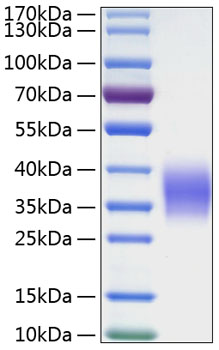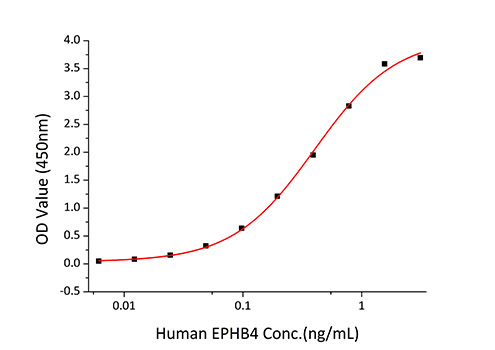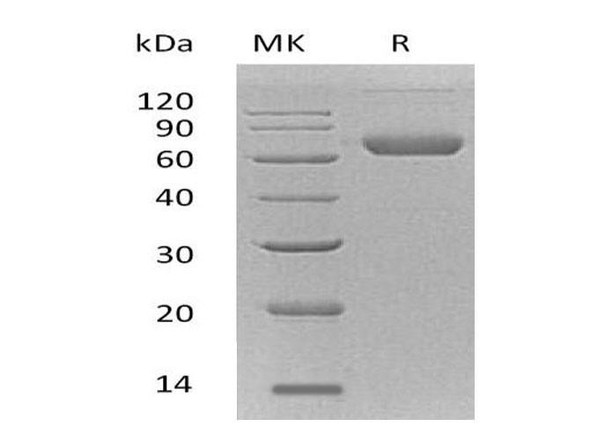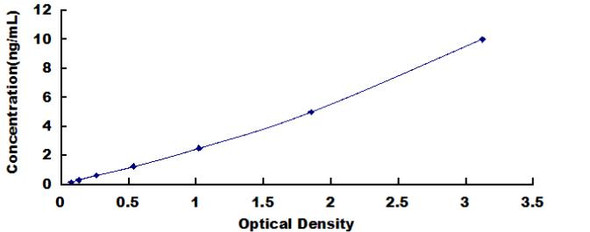Description
Recombinant Human Ephrin-B2/EFNB2 Protein
The Recombinant Human Ephrin-B2/EFNB2 Protein is a biologically active recombinant protein that plays a significant role in various cellular processes and signaling pathways in human biology. This protein is widely employed in immunological research, cell biology studies, protein-protein interaction analyses, and therapeutic development, providing researchers with a reliable tool for investigating Ephrin-B2/EFNB2 function and its implications in health and disease.
This product (SKU: RPCB0186) is produced using HEK293 cells and features a C-His tag for convenient detection and purification. The protein exhibits a calculated molecular weight of 23.04 kDa with an observed molecular weight of 30-40 kDa under denaturing conditions, achieving ≥ 90 % as determined by SDS-PAGE.. Functional bioactivity has been validated through rigorous quality control assays, confirming its suitability for demanding research applications.
Key Features
| High Purity by Affinity Chromatography | |
| Mammalian & Bacterial Expression Systems | |
| High lot-to-lot consistency via strict QC |
| Product Name: | Recombinant Human Ephrin-B2/EFNB2 Protein |
| SKU: | RPCB0186 |
| Size: | 10 μg , 20 μg , 50 μg , 100 μg |
| Reactivity: | Human |
| Synonyms: | EFNB2, EPLG5, HTKL, Htk-L, LERK5, ephrin-B2, HTKL, Htk-L, LERK5 |
| Tag: | C-His |
| Expression Host: | HEK293 cells |
| Calculated MW: | 23.04 kDa |
| Observed MW: | 30-40 kDa |
| Gene ID: | 1948 |
| Protein Description: | High quality, high purity and low endotoxin recombinant Recombinant Human Ephrin-B2/EFNB2 Protein (RPCB0186), tested reactivity in HEK293 cells and has been validated in SDS-PAGE.100% guaranteed. |
| Endotoxin: | < 0.1 EU/μg of the protein by LAL method. |
| Purity: | ≥ 90 % as determined by SDS-PAGE. |
| Formulation: | Lyophilized from a 0.22 μm filtered solution of PBS, pH 7.4.Contact us for customized product form or formulation. |
| Bio-Activity: | Measured by its binding ability in a functional ELISA. Immobilized Human EFNB2 at 0.5 μg/mL (100 μL/well) can bind Human EPHB4 with a linear range of 6-400 pg/mL. |
| Reconstitution: | Centrifuge the vial before opening. Reconstitute to a concentration of 0.1-0.5 mg/mL in sterile distilled water. Avoid vortex or vigorously pipetting the protein. For long term storage, it is recommended to add a carrier protein or stablizer (e.g. 0.1% BSA, 5% HSA, 10% FBS or 5% Trehalose), and aliquot the reconstituted protein solution to minimize free-thaw cycles. |
| Storage: | Store at -20℃.Store the lyophilized protein at -20℃ to -80 ℃ up to 1 year from the date of receipt. After reconstitution, the protein solution is stable at -20℃ for 3 months, at 2-8℃ for up to 1 week. |
This protein is a member of the ephrin (EPH) family. The ephrins and EPH-related receptors comprise the largest subfamily of receptor protein-tyrosine kinases and have been implicated in mediating developmental events, especially in the nervous system and in erythropoiesis. Based on their structures and sequence relationships, ephrins are divided into the ephrin-A (EFNA) class, which are anchored to the membrane by a glycosylphosphatidylinositol linkage, and the ephrin-B (EFNB) class, which are transmembrane proteins. This gene encodes an EFNB class ephrin which binds to the EPHB4 and EPHA3 receptors.








